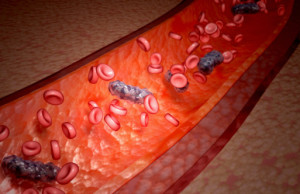In the United States, more than 2 million platelet transfusions are administered each year to treat thrombocytopenia or impaired platelet function. Since platelets must be stored at room temperature, the risk of bacterial contamination is high.
However, a new active surveillance study conducted over 7 years at Case Western Reserve University reported that septic transfusion reactions (STRs) from platelet transfusions occur more frequently than expected. Researchers identified 20 contaminated platelet units out of 51,440 screened (0.004%). Although no transfusion reactions were reported for patients transfused with theses platelets, retrospective review identified 5 patients with clinical signs and symptoms of STRs 9 to 24 hours after transfusion, including one fatality. These data highlight the need to utilize rapid diagnostic tests for bacteria detection on the day of transfusion or employ pathogen reduction technologies to reduce STRs, as recommended by the FDA and the AABB.
References

